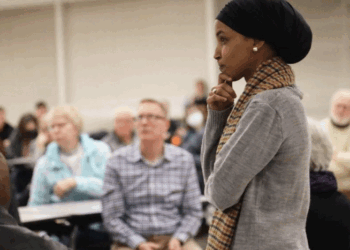Americans will go to the polls next week, and a new political landscape will emerge. Likely there will be a shift to the right, with a number of Tea Party-backed candidates taking seats in Congress. In Minnesota we have become inured to the continual irrational outbursts from Rep. Michele Bachmann — who wants her constituents “armed and dangerous”; but there will be six, seven, eight more Bachmanns in Washington next year.
For Jewish Americans, who overwhelmingly voted for Barack Obama in 2008, and favor the separation of church and state, and, generally, rationality in political discourse, the coming years will be jarring.
For example, as JTA reports, Rep. Eric Cantor, R-Va., sensing that a Republican Congress would obstruct passage of the president’s foreign operations budget, is trying to protect U.S. aid to Israel by putting it into a separate bill. Cantor, the only Jewish Republican in Congress, apparently is looking ahead to the Republican leadership acceding to the foreign policy views of more right-wing members of the party’s congressional caucus.
From certain quarters we are told that Israel’s best friends are evangelical Christians and neoconservatives — and that liberals are hostile to the security of the Jewish state; but Rep. Cantor apparently sees a threat to U.S. aid to Israel on the horizon. How will U.S. foreign policy be affected by a new crop of elected officials sharing a xenophobic view of the world?
The Tea Party effect will ripple across American politics and have an imponderable influence on the 2012 presidential election. As the AJW editorial in the last issue noted, the Tea Party promotes a policy agenda that is consonant with the pro-business, antitax views of its billionaire funders behind the scenes.
In an interview in the November edition of The Sun magazine, Chip Berlet, who has been researching and writing about right-wing movements for more than 35 years, comments that the Tea Party “started out as a fake grassroots movement funded by political elites. We call them ‘AstroTurf movements,’ after the brand of artificial grass.”
Interviewed by David Barsamian, Berlet mentions that much of the information promulgated by the Tea Party members is “demonstrably false. Some of this misinformation gets generated by spin doctors and public relations agencies and political advertising.”
Dissembling and disoriented politicians also spew an assortment of dubious “facts,” Berlet contends; and there is also the Tea partisans’ penchant for “conspiracy thinking, which takes gossip and rumor and recasts it as research and information.”
We have seen plenty of mishegas in this political cycle, and Berlet suggests “The Founders” would be dismayed to see how political discourse has become so debased.
“Thomas Jefferson said we needed an ‘informed citizenry.’ It’s the basis of our democracy, but we don’t have it today,” says Berlet. “We’ve probably never had it in an ideal sense, but in the last 10 or 20 years it’s gotten worse. We live in a propaganda society. It’s not possible to have a reasoned debate on immigration with someone who believes that Obama is a native of Kenya or part of some secret cabal led by the Jews, or the Muslims, or the Rockefeller family, or whomever. The Tea Partiers honestly believe that they are not merely arguing with fellow citizens but defending America from alien people and ideas.”
The elections will provide a mixed bag of results. Some of the fringier candidates — the Senatorial wannabe who is unfamiliar with the First Amendment, the House contender who likes to dress up on weekends as a Nazi SS officer — will become the proverbial footnotes in history. However, American democracy will remain in peril from an unprecedented amount of money pouring into election campaigns.
In Minnesota, contributions by Target and Best Buy that found their way into the coffers of the Republican candidate for governor provoked an outcry. But the problem is more insidious than we know. Robert Reich, the former treasury secretary in the Clinton administration, recently wrote on his blog: “Hundreds of millions of dollars are pouring into advertisements for and against candidates — without a trace of where the dollars are coming from. They’re laundered through a handful of groups…. The Supreme Court’s Citizens United vs. the Federal Election Commission made it possible. The Federal Election Commission says only 32 percent of groups paying for election ads are disclosing the names of their donors. By comparison, in the 2006 midterm, 97 percent disclosed; in 2008, almost half disclosed.”
In midst of the lingering recession, with a high level of unemployment, families losing their homes or finding themselves upside down in their mortgages, there is a need for members of Congress to help solve these problems.
Reich notes that there is “plenty of money to help stranded Americans, just not the political will to raise it. And at the rate secret money is flooding our political system, even less political will in the future.”
The former Cabinet official warns of a “perfect storm: An unprecedented concentration of income and wealth at the top; a record amount of secret money flooding our democracy; and a public becoming increasingly angry and cynical about a government that’s raising its taxes, reducing its services, and unable to get it back to work. We’re losing democratic capitalism to plutocratic capitalism.”
After voting on Nov. 2, we need to apply ourselves to the real work of saving this society. Demagogues are increasingly dominating political debates. We should look to the Jewish tradition of leadership in movements for social justice and to our prophetic tradition for guidance, as we try to repair the badly frayed social fabric.
— Mordecai Specktor / editor@ajwnews.com
(American Jewish World, 10.29.10)



















Mordecai: Very good editorial! Yes, we are going to be in for a frightening demogoguery irrational, perhaps even a totalitarian period of !our lives! Sincerely, Bernie Milstein